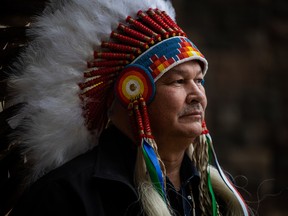Pelican Lake First Nation launches community safety officer program, anticipates expansion
"Collectively, everybody has to come together."

Article content
The COVID-19 pandemic was a turning point for Pelican Lake First Nation.
It already had an agreement with the governments of Saskatchewan and Canada that placed an RCMP sub-office and housing for two members of the Spiritwood detachment on the First Nation. When that agreement expired, the two members were no longer dedicated to Pelican Lake and instead had to serve the whole detachment area.
When the pandemic hit, the First Nation essentially locked down, with security gates and personnel at each access point. Gun activity increased in the community of approximately 1,200 on-reserve members, Chief Peter Bill said. On several occasions, elders in the community were beaten. It was an eye-opening realization.
“What we found was, I guess, the drug activity and the gang activity,” Bill said.
Pelican Lake leaders looked for solutions. In January 2022, the chief and council dedicated $500,000 of the First Nation’s funds to create a community safety officer program. Bill said three interested community members went for eight weeks of training under the provincial CSO program, and Pelican Lake built them an office in the community.
Through a provincially-managed CSO pilot project, three additional community members will be trained, bringing the total number of CSOs to six. Funding to train the latter three comes through the provincial and federal governments.
“RCMP are short-staffed, so we had to come up with means to try and keep our community safe,” Bill said.
The CSOs are familiar with the community and their presence means more uniformed officers are visible, Bill said, adding CSOs can arrive quickly at a scene and be there to share information when RCMP arrive. He noted RCMP response times stretched to two or three hours after the previous agreement with the RCMP expired.
RCMP also don’t enforce band council resolutions (BCRs) or bylaws a First Nation creates, such as Pelican Lake’s dry reserve laws. The chief and council have called on the federal government to honour and enforce the BCRs banning the import and sale of alcohol in the community, but received no response.
When asked for comment, each level of government deferred to the other.
When Pelican Lake was developing its own CSO model, its leaders visited Poundmaker Cree Nation, which faced similar challenges with BCRs not being enforced by RCMP, and it has adopted a similar mode. Like Pelican Lake, Poundmaker is looking to develop First Nations-led policing.
Pelican Lake band manager James Ramsay said this is seen as a treaty issue, and Treaty 6 First Nations are coming together, balancing the custom-based rules of each community with criminal enforcement.
“It’s expected to be a far superior approach. And if it’s more community-based, then hopefully there’s more prevention,” Ramsay said.
Bill said his vision for policing in Pelican Lake would include officers who speak Cree and can communicate and relate to the community better. It would all be rooted in custom and tradition, he said.
“We have values — values and customs.”
He sees full policing as an important next step because of the limitations on CSOs. For example, they aren’t equipped with firearms or even conducted energy weapons (Tasers). Pelican Lake has asked the province to allow CSOs to carry Tasers.
Some CSOs were involved in the manhunt and investigation after the mass stabbings on James Smith Cree Nation. They also conduct traffic stops and will be trained to do impairment checks — dangerous assignments, since officers rarely know what to expect.
“Their work is very dangerous and we’ve got to provide the tools in order for them to do their job,” Bill said.
The provincial ministry said it will review the request and discuss available options with Pelican Lake officials. The CSO program is designed to supplement local police services by addressing low-risk, high-priority cases, which further allows police to target high-risk, high-priority crimes, the ministry added.
Currently, there are 19 CSO programs with 38 trained CSOs operating in the province.
Calls for First Nations-led policing have grown louder since the Sept. 4 stabbings. RCMP have said the first report about the tragedy was made at 5:40 a.m., and the first officers were dispatched at 5:43 a.m. They didn’t arrive at the first scene until 38 minutes later.
Only one First Nations police service currently exists in Saskatchewan: the File Hills Police Service, which was incorporated in 2002. It serves five Treaty Four nations: Okanese First Nation, Peepeekisis Cree Nation, Carry the Kettle Nakoda Nation, Star Blanket Cree Nation and Little Black Bear First Nation.
Earlier this month, the Prince Albert Grand Council, provincial and federal governments signed a letter of intent, which formalizes an agreement to create the PAGC Public Safety Implementation Team. That plan aims to advance Indigenous-led public safety programs tailored to the PAGC’s 12 member First Nations and 28 communities. James Smith Cree Nation is a member of the PAGC.
“It shouldn’t take a horrific incident like that before governments open their eyes to fulfil treaty and the needs (of) First Nations,” Bill said.
“Collectively, everybody has to come together.”

Want to know how we decide what to cover and how editorial decisions are made at the Saskatoon StarPhoenix and Regina Leader-Post? Get the weekly Letter From the Editor newsletter from the Editor in Chief Russell Wangersky and join the discussion on what goes into covering news and delivering commentary, both in print and online. Click here to subscribe.








Postmedia is committed to maintaining a lively but civil forum for discussion. Please keep comments relevant and respectful. Comments may take up to an hour to appear on the site. You will receive an email if there is a reply to your comment, an update to a thread you follow or if a user you follow comments. Visit our Community Guidelines for more information.